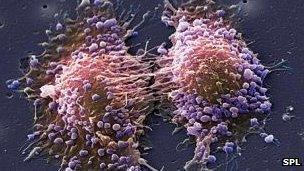Edinburgh study pinpoints prostate cancer 'growth' gene
- Published

The researchers looked at the genes that control the formation of the prostate gland
Scientists from Edinburgh University have pinpointed a gene they say could lead to improvements in the diagnosis and treatment of prostate cancer.
The team studied genes that control the formation of the prostate gland and identified one known as Decorin.
The presence of this gene was reduced in tumours compared to normal prostate cells.
The researchers now hope measurement of Decorin levels could become a reliable diagnostic test for prostate cancer.
The study by scientists from the Centre for Reproductive Health was funded by Prostate Cancer UK and the Medical Research Council (MRC).
They believe the gene, Decorin, may play an important role in tumour growth.
Lead researcher, Dr Axel Thomson, said: "We pinpointed which genes were active in embryonic prostate development and compared their behaviour in the development of prostate cancer.
"Through this process we were excited to discover that the presence of one gene - Decorin - was reduced in tumours compared to normal prostate cells.
"This observation suggests that Decorin's normal role may be to slow cancer growth, which is a really exciting possibility.
'More clues'
He added: "If our suspicions are verified then this could mean that, in the future, measurement of Decorin levels could become a reliable diagnostic test for prostate cancer and also help determine how aggressive the disease is."
The finding comes as part of an ongoing research exploring how the environment surrounding cancer cells affects tumour growth.
Dr Kate Holmes, from Prostate Cancer UK, said: "This type of early stage research is vital to help us improve our understanding of prostate cancer development and move towards finding better ways to diagnose and treat the disease.
"Every year 10,000 men lose their lives to the disease, yet we still have very little knowledge of how prostate tumours develop and grow.
"It is vital that more research of this nature is undertaken and supported so that more clues, such as these, can be discovered."
The team's findings are being published in the scientific journal, PLOS ONE., external
- Published19 June 2012
- Published16 May 2012
- Published19 April 2012
- Published17 April 2012
- Published24 September 2011
- Published1 December 2010